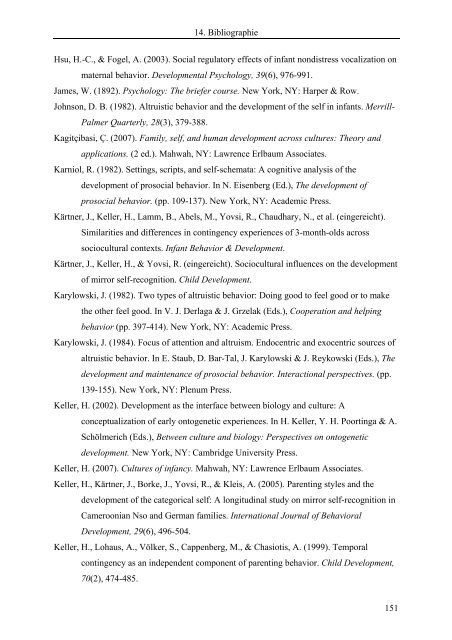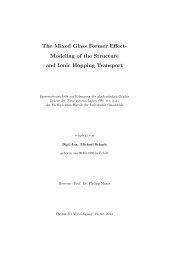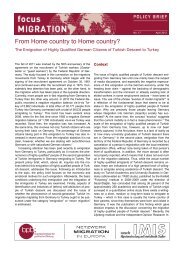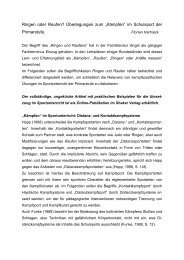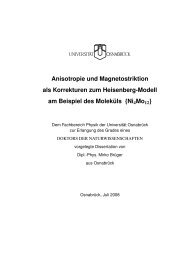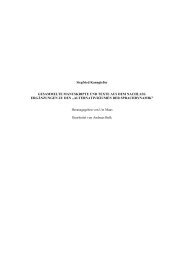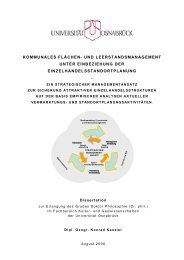Einflussgrößen auf die Entwicklung empathischen Erlebens und ...
Einflussgrößen auf die Entwicklung empathischen Erlebens und ...
Einflussgrößen auf die Entwicklung empathischen Erlebens und ...
Erfolgreiche ePaper selbst erstellen
Machen Sie aus Ihren PDF Publikationen ein blätterbares Flipbook mit unserer einzigartigen Google optimierten e-Paper Software.
14. Bibliographie<br />
Hsu, H.-C., & Fogel, A. (2003). Social regulatory effects of infant nondistress vocalization on<br />
maternal behavior. Developmental Psychology, 39(6), 976-991.<br />
James, W. (1892). Psychology: The briefer course. New York, NY: Harper & Row.<br />
Johnson, D. B. (1982). Altruistic behavior and the development of the self in infants. Merrill-<br />
Palmer Quarterly, 28(3), 379-388.<br />
Kagitçibasi, Ç. (2007). Family, self, and human development across cultures: Theory and<br />
applications. (2 ed.). Mahwah, NY: Lawrence Erlbaum Associates.<br />
Karniol, R. (1982). Settings, scripts, and self-schemata: A cognitive analysis of the<br />
development of prosocial behavior. In N. Eisenberg (Ed.), The development of<br />
prosocial behavior. (pp. 109-137). New York, NY: Academic Press.<br />
Kärtner, J., Keller, H., Lamm, B., Abels, M., Yovsi, R., Chaudhary, N., et al. (eingereicht).<br />
Similarities and differences in contingency experiences of 3-month-olds across<br />
sociocultural contexts. Infant Behavior & Development.<br />
Kärtner, J., Keller, H., & Yovsi, R. (eingereicht). Sociocultural influences on the development<br />
of mirror self-recognition. Child Development.<br />
Karylowski, J. (1982). Two types of altruistic behavior: Doing good to feel good or to make<br />
the other feel good. In V. J. Derlaga & J. Grzelak (Eds.), Cooperation and helping<br />
behavior (pp. 397-414). New York, NY: Academic Press.<br />
Karylowski, J. (1984). Focus of attention and altruism. Endocentric and exocentric sources of<br />
altruistic behavior. In E. Staub, D. Bar-Tal, J. Karylowski & J. Reykowski (Eds.), The<br />
development and maintenance of prosocial behavior. Interactional perspectives. (pp.<br />
139-155). New York, NY: Plenum Press.<br />
Keller, H. (2002). Development as the interface between biology and culture: A<br />
conceptualization of early ontogenetic experiences. In H. Keller, Y. H. Poortinga & A.<br />
Schölmerich (Eds.), Between culture and biology: Perspectives on ontogenetic<br />
development. New York, NY: Cambridge University Press.<br />
Keller, H. (2007). Cultures of infancy. Mahwah, NY: Lawrence Erlbaum Associates.<br />
Keller, H., Kärtner, J., Borke, J., Yovsi, R., & Kleis, A. (2005). Parenting styles and the<br />
development of the categorical self: A longitudinal study on mirror self-recognition in<br />
Cameroonian Nso and German families. International Journal of Behavioral<br />
Development, 29(6), 496-504.<br />
Keller, H., Lohaus, A., Völker, S., Cappenberg, M., & Chasiotis, A. (1999). Temporal<br />
contingency as an independent component of parenting behavior. Child Development,<br />
70(2), 474-485.<br />
151


